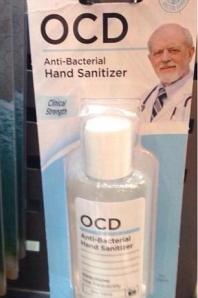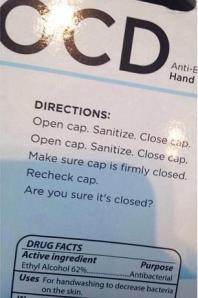Dear Mr Prime Minister,
Today, for the first time in my adult life, I voted in a UK General Election. I walked into that polling station seething from yet another pointless session at my local mental health centre. Neither I nor the consulting psychiatrist quite knew why I was there. She was replacing my previous consultant and this was an appointment scheduled by him some time ago; I was under the impression that today I would be beginning a much awaited course of OCD focused psychotherapy. Turns out that it was just a brief review session to see if I was getting on okay with my latest medication combo. The psychotherapy is, apparently, still pending. You see, despite being referred formally for specialised psychotherapy in March, I am yet to receive any confirmation from the designated psychotherapy team. Apparently they were supposed to have sent me a questionnaire weeks ago to kick things off. Nope. So I’m told to book another appointment for three months’ time, hopefully by then we will have heard back from the psych team. Yay.
To put this into a little bit of perspective.
I was first diagnosed with OCD over five years ago – shortly before we saw the dawn of the most recent incarnation of what one might call a government back in 2010. I was diagnosed in early spring, put on medication a week later and then, one month after beginning the meds, underwent a brief telephone assessment which, as far as I could tell, was designed to assess the likelihood of my committing suicide. With the suicide risk formally assessed, I was told I would be put on the waiting list to see a CBT therapist; I might have to wait a few months as there was a bit of a backlog, but I was on the list. A few months seemed liked a forever at that point in time but, I understood that when demand is high and funds are tight, waiting lists are inevitable. To be on the list, any list, was a relief.
It took eighteen months, and much chasing, before I was finally sitting in front of a CBT therapist. Turns out, my therapist didn’t really have what I would call a good grasp of Obsessive Compulsive Disorder. Or maybe he did, and I just didn’t get it. Either way, with his broader ‘let’s just try and make you less anxious’ approach, it wasn’t long before my confidence in the process started to wean. It evaporated completely the day that he said this:
“An HIV positive person could spit in your mouth and you would not catch HIV”.
Not helpful. At all. Firstly, I know this, this is not brand new information. Secondly, this does not ease the anxiety of an OCD freakout. Thirdly, how the hell is this supposed to help me walk to work without obsessing about every speck of reddish brown that happens to be on the floor? To be fair, he thought he was helping, but he wasn’t. In that single sentence I knew that he just did not understand and could not help me in the long term. The trust was gone. After a particularly emotive session which ended with my walking out long before my hour was up, we decided that I should see a different therapist.
After a year or so of yet more chasing, in July 2012 I was introduced to the next therapist. This person was fantastic, she had a clear treatment plan and set clear objectives that I would be expected to meet throughout the 12 weeks of treatment (one hour per week for 12 weeks was the standard at the time). There were a number of strategies that my therapist used that proved to be quite useful and, surprisingly, very good at challenging both the obsessions and the compulsions (Exposure Response Prevention, or ERP was particularly helpful). It was a difficult and emotional process but, by the time week 12 came around, I felt more positive about my life and my mind. OCD was still very much there but the sting of the freakouts did not cut quite as deep, and did not last as long. For me, this was amazing. Still, as I walked out of the final session there was a pang of sadness, a shadow of fear that somehow the OCD monster would creep back into the room. Unfortunately, without going to see someone privately (which I could not afford), I was pretty much out of options, nothing left but to go it alone, and hope for the best.
Two or so years later (June 2014) and I found myself at my local GP surgery, sobbing, terrified and begging for help. I didn’t want to be on the earth anymore, I couldn’t face the waking hours, I hated the thought of living with this thing for the rest of my life. I was making myself, and the people around me, miserable. My GP upped my OCD meds back up to the maximum dose (we had agreed that I was ready to move to a lower dose six months earlier) and signed me off work. She referred me to a local talk therapy service for CBT therapy and also fired off a request for advice from a consulting psychiatric team. They told the GP to put me on a new type of medication, in addition to the one I was on, a medication that was so strong that it would first require a kidney function test. This, without having even met me. They tell my GP that, if the new medication doesn’t work, she should write back and they’ll reconsider my options. I researched the drug online and also wrote to an expert in the area of OCD. Nothing I read suggested that this was a standard medication of choice for OCD, but rather a drug for Generalised Anxiety Disorder. The expert himself expressed surprise that I would be prescribed this drug. After much thought I decided against the blind prescription. My GP wrote back to the mental health team.
In August 2014 I started my second round of CBT therapy. In the first session I answered some questions about my general mental health and levels of anxiety and I also completed an OCD ‘test’ (i.e. to determine the severity of my own particular brand). After completing said test, the therapist confessed that he didn’t think he would be able to do much about my OCD as it was too severe and he didn’t think himself entirely qualified. So instead he suggested that we work on helping me feel less depressed. Needless to say, I wasn’t much impressed, given that the main reason I feel depressed is because of the OCD. But hey, the dude’s a pro, I will trust his professional judgement. Some weeks later and the words ‘bulimia’ and ‘body dysmorphia’ are peppering the air like tickertape; I must admit that I began to forget that the whole purpose of this treatment course was to help me deal with the OCD. Somehow, this had been swept to one side, in favour of discussions about food addiction and fat. By the end of the treatment (8 weeks initially, then increased to 10 for good behaviour – no, seriously), once again I found myself wondering why it was so difficult for me to speak to someone who actually had experience of treating someone with Obsessive Compulsive Disorder. Was this why I paid my taxes? To play musical chairs around the broken infrastructures of the NHS?
Early September 2014 and I go back to my GP to see about the referral to the psych team. She asked me again if I would consider taking the medication. I said no. She said she would see what was happening with the referral. I finally get a letter telling me that I would have an appointment in nine weeks’ time. Just nine weeks! Because, you know, nine weeks just fly the fuck by when you feel like you’re going crazy and you just want someone to help you. I attend the appointment and complete yet another anxiety themed questionnaire to assess my suicide risk. I am told that medication is the way forward at this point in time, but they’ll have to check with my doctor. Okay. They tell me that I will probably need to be referred for psychotherapy, but that they will have to talk to my CBT therapist first to get the okay from him to refer me; you know, the same CBT therapist who said he couldn’t help my OCD because it was too severe. Makes sense, right?
Long story short, it’s 7th May 2015 and I am STILL waiting to see a psychotherapist. Five years after my initial diagnosis. In that time I have been on the highest dose of medication for OCD; have swallowed approximately 6,000+ pills in a bid to stay this illness; I have completed Christ knows how many anxiety/suicide questionnaires; I have seen three CBT counsellors; I have been told off by a GP for wasting her time because I wasn’t suicidal; I have been signed off work for a total of five months; I have been told that I don’t understand my own illness by a mental health professional; I have been fobbed off time and time again; I have wanted to die.
I have wanted to die.
And I am in no way the only one. There are millions of us who are forced to live in this universe called Anxiety. Living in fear, all day, every damn day. Afraid to get out of bed, afraid to go to school, afraid to go to work, afraid to live their lives. Their fears are all-consuming, terrifying and real. They live in a world that stigmatises their reality, a world that struggles to comprehend mental illness for what it is – a 24 hr prison cell, a 24 hr tip-toe around the sleeping monster within. No breaks, no sleep, terror is hiding everywhere. For so many people in this country, it seems like there is no way out.
And that’s the kicker. That’s the thing that Cameron & Co. just don’t seem to have understood. Ever. The worst outcome of untreated mental illness is not ‘x number of hours lost in sickness absence per year’; or ‘sum x of UK taxpayers’ money spent on Statutory Sick Pay’ – or however else they choose to measure it. The worst outcome of an untreated mental illness is death. People die every day from a mental illness, from a disease of the mind. Is that really so difficult to understand? Hearts stop every day because their owners cannot live with their own minds. Life wasted, because somehow they got lost in a system that is itself the bloated product of profound mismanagement and a serious lack of organisation at the most local levels.
This is an organisation that has the very best of staff having to make do with the worst of foresight from one government after another. They are overworked and underpaid, underfunded and yet, somehow, also under resourced. Tell me again how this most recent government has given a damn about mental health? Tell me again how they’re going to do things differently next time? Only don’t tell me that the answer is in cutting funds, because anyone can see that any cut to funds at this point in time will result in more people like me, depressed, isolated and waiting five years (and counting) for help. The answer lies in changing outdated attitudes to mental health. It lies in seeing the NHS for what it once was and what it could be: our most vital asset. Save it, reform it, do not abandon it. To abandon it would be to abandon millions.
So, Mr Prime Minister, it’s up to you. Will you help me? Will you help the millions like me?





